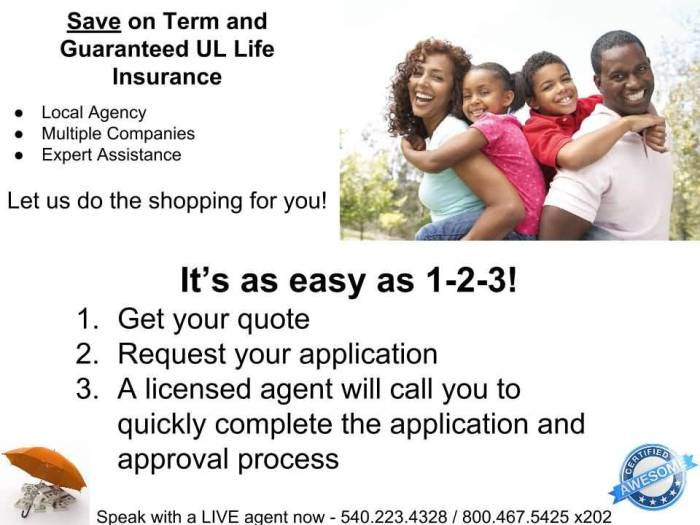Get insurance quotes from multiple companies is crucial for securing the best possible deals. Shopping around for various insurance options can lead to significant cost savings. Understanding the different methods for obtaining quotes, the factors influencing insurance costs, and how to interpret quotes is key to finding the right coverage. This comprehensive guide will walk you through the process, from comparing quotes to choosing the best policy for your needs.
Comparing insurance quotes can feel overwhelming, but it’s a worthwhile effort. Different insurance providers offer varying rates and coverage options. By leveraging online tools and consulting with agents, you can effectively navigate the process and identify the most suitable plan for your circumstances. Factors like your driving record, location, and vehicle type play a role in determining your premiums.
Understanding these factors and how they impact different types of insurance, like car, home, and health, empowers you to make an informed decision.
Introduction to Comparing Insurance Quotes

Source: picpedia.org
Unlocking the best insurance deals starts with comparing quotes from multiple providers. This proactive approach empowers you to make informed decisions and potentially save substantial sums of money. Many people find the insurance selection process daunting, often feeling overwhelmed by complex terminology and a myriad of options. However, comparing quotes is a straightforward process that can significantly benefit your financial well-being.Insurance selection often presents challenges for consumers.
Navigating the plethora of providers and policies can feel like navigating a maze. Understanding coverage specifics, deductibles, and policy terms often requires considerable research and effort. Furthermore, the varying pricing structures across different insurance companies can make choosing the right plan a confusing process. Comparing quotes provides a systematic method to overcome these obstacles.
Benefits of Comparing Quotes
Comparing quotes from multiple insurance companies offers a clear path towards better deals and substantial cost savings. By obtaining quotes from various providers, you gain a comprehensive understanding of the market. This broad perspective allows you to analyze different coverage options and identify the most suitable policy for your needs. Potential savings can range from modest to substantial, depending on the policy and the comparison process.
Factors Influencing Insurance Costs
Several factors contribute to the cost of insurance premiums. Understanding these elements can help you make informed choices and negotiate favorable rates.
- Driving record: A clean driving record typically leads to lower premiums, as it demonstrates a lower risk profile for the insurer. Conversely, accidents or traffic violations often result in higher premiums.
- Vehicle type and model: Certain vehicle models and types are associated with higher accident rates, leading to higher insurance premiums. Similarly, vehicles equipped with advanced safety features or those considered less susceptible to theft typically receive lower rates.
- Location: Geographical location significantly impacts insurance costs. Areas with higher crime rates or accident frequencies typically have higher premiums. This reflects the insurer’s assessment of risk in different regions.
- Coverage choices: The extent of coverage chosen impacts the premium. Policies with comprehensive coverage, higher liability limits, and additional add-ons like roadside assistance or rental car coverage generally result in higher premiums.
Strategies for Obtaining Quotes
Effectively comparing insurance quotes involves employing strategic methods. This proactive approach empowers you to maximize your savings.
- Use online comparison tools: Numerous online platforms specialize in aggregating quotes from various insurance companies. These tools simplify the process by providing a streamlined comparison of quotes, saving time and effort.
- Contact multiple insurance agents: Consulting multiple insurance agents provides an opportunity to discuss your needs and preferences directly. This direct interaction allows you to tailor your policy to your specific circumstances.
- Consider different coverage options: Exploring different coverage options can lead to discovering tailored plans that align with your needs and budget. Policies with various deductibles, coverage limits, and add-ons offer a range of options to match your individual requirements.
Methods for Obtaining Multiple Quotes

Source: thebottomsupblog.com
Securing the best possible insurance rates involves comparing quotes from various providers. A strategic approach to obtaining these quotes is essential for achieving optimal value. This often involves employing different methods, each with its own advantages and disadvantages.Obtaining multiple quotes allows you to compare premiums, coverage options, and deductibles, ultimately helping you find a policy that aligns with your specific needs and budget.
Careful consideration of the available methods and their nuances is crucial for making informed decisions.
Online Comparison Tools
Online tools are a convenient and efficient way to compare quotes from multiple insurance providers. These platforms typically gather quotes from a range of companies, presenting them in a user-friendly format. This significantly reduces the time and effort required to collect quotes from different providers.
- Speed and Efficiency: Online comparison tools provide rapid access to a broad range of quotes, enabling quick comparisons and informed decision-making.
- Comprehensive Coverage: These tools frequently cover various insurance types, such as auto, home, and life insurance.
- Ease of Use: Most online comparison tools have intuitive interfaces, making it straightforward to input details and compare quotes.
However, there are potential drawbacks. Limited personal guidance is a common characteristic, and the tools may not always cover all available insurance options.
Insurance Agents
Insurance agents offer a personalized service, providing expert advice and guidance tailored to your specific needs. They possess a wealth of knowledge about various insurance products and can help you navigate the complexities of the insurance market.
- Personalized Service: Agents can provide tailored recommendations, considering your unique circumstances and preferences.
- Comprehensive Advice: Agents can advise on the most suitable insurance products and coverage options.
- Negotiation Support: Agents can often negotiate favorable terms with insurers on your behalf.
While agents offer a personalized experience, their services may come with additional fees and potentially involve a longer process than using online comparison tools.
Table of Methods for Obtaining Multiple Quotes
| Method | Pros | Cons | Steps |
|---|---|---|---|
| Online Comparison Tools | Fast, easy, compare many options | Limited agent support, may not cover all types of insurance | Enter details, compare quotes, choose best deal |
| Insurance Agents | Personalized advice, comprehensive service | May take longer, potential for higher fees | Consult agent, provide details, receive quotes |
Factors Influencing Insurance Costs

Source: thebottomsupblog.com
Insurance premiums aren’t set arbitrarily; they are carefully calculated based on various factors that reflect the risk a company assumes when insuring you or your property. Understanding these factors is crucial for making informed decisions about your insurance coverage and potentially negotiating better rates.
Key Factors Affecting Insurance Premiums
Several key factors significantly impact the cost of insurance. These factors are evaluated by insurance companies to determine the likelihood of a claim and, consequently, the premium amount. Careful consideration of these factors is essential when choosing insurance policies.
- Driving Record: A driver’s past driving record, including accidents and traffic violations, is a major determinant in car insurance premiums. A clean driving record typically results in lower premiums, while a history of accidents or violations leads to higher premiums. This is because a history of incidents indicates a higher risk of future claims. For instance, a driver with multiple speeding tickets might face a substantial increase in their car insurance cost compared to a driver with no violations.
- Location: Geographic location plays a vital role in insurance costs. Areas with higher crime rates or accident frequencies often have higher premiums. The density of traffic and road conditions in a given area are also key elements that influence car insurance rates. Home insurance rates are also affected by location, as areas prone to natural disasters or with high property values often have higher premiums.
- Vehicle Type: The type of vehicle significantly impacts car insurance premiums. Luxury or high-performance vehicles are often more expensive to insure due to their higher repair costs and potential for theft. The value of the vehicle and its features are significant factors.
- Home Value and Condition: Home insurance premiums are directly related to the value of the property. A more expensive home typically carries a higher premium. The condition of the home, including its age and features like security systems, also influences the risk assessment and premium. Homes in areas with a higher risk of natural disasters, such as floods or wildfires, will typically have higher premiums.
- Health Conditions: Health insurance premiums are influenced by factors such as pre-existing conditions. Individuals with pre-existing conditions might face higher premiums compared to those without. The cost of healthcare in a specific location is also a factor, impacting health insurance costs.
Comparison Across Insurance Types
Different types of insurance—car, home, and health—are affected by various factors. The relative importance of these factors can differ substantially across the insurance types.
| Factor | Car Insurance | Home Insurance | Health Insurance |
|---|---|---|---|
| Driving Record | Affects rates significantly | Less direct impact, but still a factor | Affects rates indirectly (e.g., through pre-existing conditions) |
| Location | High-risk areas have higher rates | Property values and risk level | Healthcare availability and costs |
| Vehicle Type | High-value or high-performance vehicles have higher rates | N/A | N/A |
| Home Value | N/A | Directly affects rates | N/A |
| Health Conditions | N/A | N/A | Directly affects rates |
Understanding the Quotes

Source: quotesbae.com
Insurance quotes, while seemingly straightforward, contain crucial details that significantly impact your financial obligations and the protection you receive. Carefully reviewing these quotes is essential to ensure you understand the coverage offered and how it aligns with your needs.Insurance quotes are essentially proposals outlining the terms and conditions of a specific policy. Each company’s quote presents a unique set of provisions, and a thorough analysis of these proposals is key to making an informed decision.
A critical step in this process is understanding how the different elements of a quote work together.
Decoding Insurance Quote Language
Understanding the technical jargon in insurance quotes is vital for making an informed decision. Insurance policies often utilize specific terminology, and grasping these terms allows you to precisely evaluate the scope of coverage and associated costs. A clear understanding of the language is crucial for accurately comparing different policies.
Important Terms and Conditions
Insurance policies contain various clauses outlining responsibilities, limitations, and exclusions. These terms and conditions are vital to understand as they define the specific parameters of your coverage. Familiarizing yourself with these conditions ensures that you have a clear grasp of what’s included and excluded in your policy.
- Policy exclusions: These clauses detail specific circumstances or events that the insurance company will not cover. Understanding these exclusions is crucial to prevent surprises when a claim is made.
- Limitations on coverage: Policy limits define the maximum amount the insurer will pay for a particular claim or event. Understanding these limits helps determine the extent of financial protection you have.
- Claims procedures: The policy will specify how to file a claim and the steps involved in the claims process. Understanding these procedures helps ensure a smooth and efficient claims process if needed.
Coverage Options Explained
Different insurance policies offer various coverage options to cater to diverse needs. Understanding the various coverage types available is crucial for choosing the right policy.
- Liability coverage: This type of coverage protects you from financial responsibility if you cause harm or damage to others. It typically covers damages to property or injuries to people involved in an accident.
- Collision coverage: Collision coverage pays for damages to your vehicle if it’s involved in an accident, regardless of who is at fault. It covers the repair or replacement costs.
- Comprehensive coverage: This coverage protects your vehicle from non-collision damage, such as vandalism, fire, theft, or weather-related events.
Factors Affecting Insurance Costs
Several factors influence the cost of insurance premiums. Understanding these factors helps you evaluate and compare different policies effectively.
- Deductibles: The deductible is the amount you pay out-of-pocket before insurance coverage begins. Higher deductibles generally result in lower premiums, but you’ll need to cover a larger portion of the costs initially if a claim is filed.
- Premiums: Premiums are the regular payments made for insurance coverage. Factors such as your driving record, vehicle type, location, and coverage choices influence premium amounts.
- Coverage limits: Coverage limits specify the maximum amount the insurer will pay for a covered event. Higher limits generally lead to higher premiums, but they provide greater financial protection.
Common Insurance Terms, Get insurance quotes from multiple companies
Understanding common insurance terms is essential for interpreting quotes accurately.
| Term | Definition |
|---|---|
| Premium | Regular payment for insurance coverage |
| Deductible | Amount you pay out-of-pocket before insurance covers costs |
| Coverage Limit | Maximum amount the insurer will pay for a covered event |
| Liability Coverage | Protection from financial responsibility if you cause harm to others |
| Collision Coverage | Pays for damages to your vehicle in an accident, regardless of fault |
| Comprehensive Coverage | Protects your vehicle from non-collision damage |
Tips for Choosing the Right Insurance
Selecting the right insurance policy involves more than just comparing prices. A thorough evaluation of coverage, policy terms, and potential future needs is crucial. Understanding the nuances of different policies can save you money and ensure you’re adequately protected.Choosing the right insurance involves careful consideration of your individual circumstances and needs. Factors such as your lifestyle, assets, and potential risks should all play a role in your decision-making process.
Don’t just focus on the lowest price; prioritize comprehensive coverage that aligns with your unique requirements.
Evaluating Policy Options
A key aspect of choosing the right policy is understanding the nuances of different policy options. Policies vary widely in terms of coverage limits, deductibles, and exclusions. Carefully review each policy’s details to identify any potential gaps in coverage.A thorough comparison of policy options is essential. Use a spreadsheet or comparison tool to organize the details of each policy.
This structured approach will allow you to easily identify differences in coverage, deductibles, and premiums. Consider factors such as the types of risks covered and the level of protection offered by each policy.
Negotiating with Insurance Providers
Negotiation with insurance providers can be a valuable tool for securing a more favorable policy. Be prepared to discuss your needs and expectations, and be willing to compromise on certain aspects of the policy. Be polite and professional throughout the negotiation process.Demonstrate a clear understanding of your needs and expectations to insurance providers. Highlight any specific concerns or requirements.
A clear articulation of your needs can lead to a policy that better meets your requirements. Be prepared to discuss alternative options if the initial offer doesn’t align with your budget or needs.
Reading the Fine Print
Thorough review of the fine print is crucial for avoiding potential surprises and ensuring you understand the full implications of the policy. Insurance policies often contain complex language and jargon, so seek clarification from the provider if anything is unclear.Understanding the fine print ensures you are aware of the complete terms and conditions of the policy. Pay close attention to details such as exclusions, limitations, and renewal clauses.
This diligence can prevent disputes or unexpected financial obligations down the road. Seek assistance from a financial advisor or legal professional if you need help deciphering complex policy language.
Comparing and Evaluating Coverage
Comparing and evaluating coverage involves a systematic approach to identify the best fit for your needs. Create a table or spreadsheet to organize the various policies and their associated features. Categorize coverage based on your personal risk factors.Consider creating a table to compare policies side-by-side. This organized approach will allow you to quickly compare coverage limits, deductibles, and premium costs.
Include columns for the type of coverage (e.g., medical, liability), coverage amount, and premium. This will make comparing different policies more efficient.
Tips for Selecting the Best Insurance Policy
- Thoroughly research different insurance providers and policies to compare coverage options, premiums, and customer service ratings.
- Consider your current financial situation and future needs to determine the level of coverage you require.
- Compare policy exclusions and limitations carefully, ensuring they align with your specific circumstances.
- Don’t solely rely on price; prioritize comprehensive coverage that addresses your potential risks.
- Seek clarification from insurance providers on any ambiguous policy terms or jargon.
- Actively participate in negotiations with insurance providers to secure the best possible policy.
Insurance Comparison Tools and Services
Online insurance comparison tools have become invaluable resources for consumers seeking competitive quotes. These platforms streamline the process of obtaining multiple quotes from various insurers, allowing individuals to make informed decisions about their coverage needs. By understanding the features and limitations of these tools, consumers can leverage them effectively to secure the most suitable insurance plan.
Features of Popular Online Comparison Tools
These tools typically offer a user-friendly interface where users input their personal information and desired coverage details. Key features often include:
- Comprehensive Data Collection: Users provide details about their vehicle, home, or personal characteristics to receive customized quotes. This data often includes vehicle year, make, and model, home address, driving history, and personal details.
- Multiple Insurer Integration: The platform connects with a network of insurance companies, enabling users to compare quotes from multiple providers. This eliminates the need to contact each company individually.
- Customized Quote Generation: Users can tailor their searches to specific coverage options and deductibles, allowing for precise comparisons. Users can often compare various add-on coverage options for specific needs, such as roadside assistance or rental car insurance.
- Quote Comparison and Filtering: Tools often present quotes in a clear, organized format, allowing easy comparison of pricing and coverage details. Users can filter quotes based on factors like price, coverage types, or specific policy features.
- Policy Documents and Information: Some platforms provide access to policy documents and information about the insurers, allowing users to gain a deeper understanding of their coverage.
Pros of Using Comparison Tools
The benefits of utilizing these platforms are substantial:
- Time Savings: Obtaining quotes from multiple insurers can be time-consuming. Comparison tools significantly reduce this time by automating the process.
- Cost Savings: By comparing quotes from various companies, users can potentially identify the most cost-effective insurance plan tailored to their needs. This often leads to substantial savings, particularly if the user’s profile and needs are complex.
- Informed Decision-Making: The comparative data allows users to evaluate different coverage options and choose the one that best meets their specific requirements. This allows for a more informed and reasoned decision.
- Ease of Access: Users can access and compare quotes from anywhere with an internet connection, making the process convenient and accessible.
Cons of Using Comparison Tools
While these tools are beneficial, certain drawbacks exist:
- Potential for Incompleteness: The accuracy of quotes depends on the completeness and accuracy of the data provided by the user. Incomplete or inaccurate data can result in inaccurate or misleading quotes.
- Hidden Fees or Charges: Some companies may charge hidden fees or add-on costs not explicitly visible in the initial quote. It’s crucial to thoroughly review the fine print before committing to a policy.
- Dependence on Platform Accuracy: The reliability of the comparison tool’s data and algorithms influences the outcome. Users should be cautious about relying solely on a single comparison tool.
Reputable Online Insurance Comparison Platforms
Several well-regarded online insurance comparison platforms exist, each with its own strengths and weaknesses. Examples include:
- Insurify: A platform well-known for its wide range of insurance products and ease of use.
- Policygenius: Known for its focus on providing various types of insurance policies to meet diverse customer needs.
- QuoteWizard: A platform providing comprehensive insurance quotes across a wide range of products, enabling a quick comparison.
Using a Comparison Tool (Flow Chart)
The following chart illustrates the typical process involved in using a comparison tool:
| Step | Action |
|---|---|
| 1 | Input personal and vehicle details |
| 2 | Specify desired coverage and options |
| 3 | Review and compare quotes from multiple insurers |
| 4 | Select the most suitable quote |
| 5 | Contact the chosen insurer for further information and finalization |
Ultimate Conclusion

Source: googleusercontent.com
In conclusion, getting insurance quotes from multiple companies is a strategic move for securing the best value for your money. By comparing various options, understanding the factors influencing costs, and carefully evaluating quotes, you can confidently choose an insurance plan that aligns with your budget and needs. Armed with the knowledge provided in this guide, you are well-equipped to navigate the insurance market effectively and achieve significant savings.
FAQ Explained: Get Insurance Quotes From Multiple Companies
What are some common online insurance comparison tools?
Several reputable online platforms allow you to compare quotes from multiple insurers. Some popular choices include [insert a few examples of well-known comparison sites].
How long does it typically take to get insurance quotes?
The time required to obtain quotes varies depending on the method. Online tools often provide instant quotes, while working with an agent may take longer due to the personalized service.
Can I get insurance quotes for different types of insurance (e.g., car, home, health) on one platform?
Some online comparison tools allow you to request quotes for various insurance types, streamlining the process. However, it’s important to verify that the platform covers the specific types of insurance you need.
What is the best method for getting quotes if I’m looking for specialized insurance?
For specialized insurance needs, consulting with an insurance agent is often recommended. They can provide tailored advice and help navigate the complexities of unique situations.
